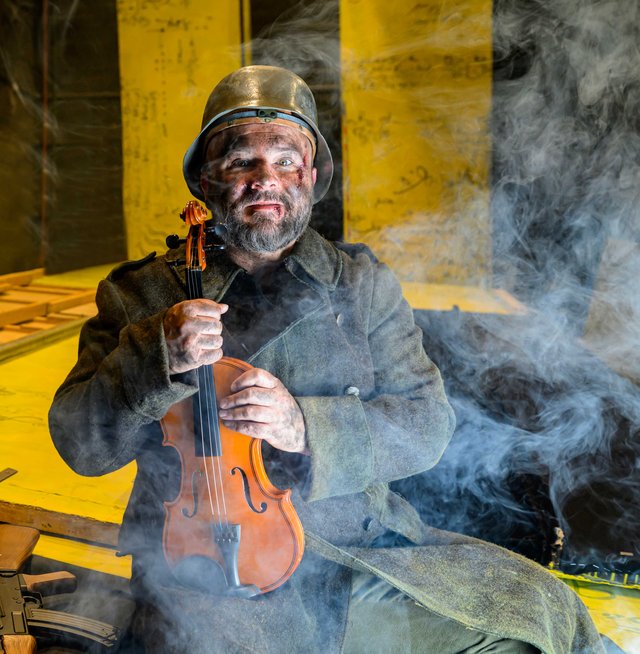Musik für die Lebenden
Gija Kantscheli
Opera in two akts
Libretto by Robert Sturua
new production of Theater Bonn
–In various languages with German and English surtitles–
MUSIC FOR THE LIVING is a production as part of the OPER! Award 2023-winning series FOKUS'33 of the Bonn Theatre. The project is funded by the Ministry of Culture and Science of the State of North Rhine-Westphalia.
Conductor: Daniel Johannes Mayr | Director: Maxim Didenko
14+ approx. 2 hoursThe world is sick, it moans and groans in war. The people fear for their future and look for solace in… music.
A blind old man teaches surviving children music-making. In a hospital a touring production of an opera entitled “Love and Guilt” is given, which shortly before it ends, is subject to a bombardment which wipes out all involved, including the audience. But again, music shepherds in hope in this dark world and the opera ends with a choral apotheosis.
The whole opera is a parable resembling in some way a middle age mystery play or passion play. Kantscheli’s score is a colorful sound tapestry which encompasses discreet musical accompaniment of acting, references to popular music genres and sometimes outright parody of “Grand Opera”. Kantscheli is a master of choral music and his children’s chorus’ and opera chorus’ parts are special highlights in his score.
In its FOKUS ’33 series the Theater Bonn has excavated little known and rarely performed works in the opera repertoire from the 20th Century that went in new directions.
Gila Kantscheli (1935-2019) was a Georgian composer mainly known in the West for his symphonies, whereas in the Soviet Union his renown was owing to his many film scores and for incidental music for the theater. MUSIK FÜR DIE LEBENDEN is his only opera. Its libretto was written by Georgian author and theater director Robert Sturua (born in 1938). Sturua’s aesthetic combines a certain predilection for the grotesque, the interplay of comedy and tragedy and a parable-like social criticism that he inherited from Bertolt Brecht’s work. The opera premiered in 1984 in Tiflis and was revised for a production in 1999 in Weimar. It hasn’t been performed since.
Cast
Uri Burger (Termine)
Camilla Fiumara (Termine)
Nikos Fragkou (Termine)
Manon Greiner (Termine)
Laura Guy (Termine)
Shinnosuke Nagata (Termine)
Andrew Pan (Termine)
Aya Sone (Termine)
Victor Villareal (Termine)
Alexander Fend
NN
Jessica Rucinski
Hyeli Kim
Dates and Tickets



